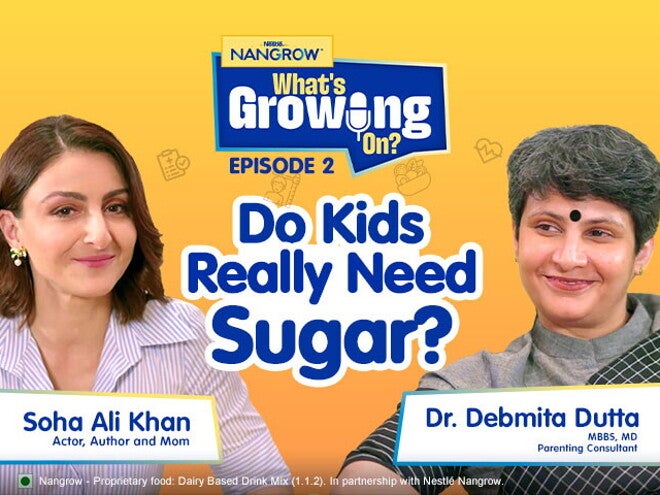Do Kids Really Need Sugar? Separating facts from myths
Watch Dr. Debmita Dutta talk about sugar, and how it affects your toddler’s behavior.
Dr. Debmita Dutta, joining the conversation as a parenting and wellness consultant, provides valuable perspective on navigating complex "toddler moments”. She emphasizes that while parents often focus on height and weight, nutrition is fundamentally interconnected with a child's emotional regulation and feelings, having a massive impact on their emotions.
Beyond nutrition, she covers topics like tantrums (viewed as a sign of brain development), shyness (a protective mechanism), and pretend play (a total brain workout), stressing that the parental role is to provide the right environment, opportunities, and fuel for their children to thrive.
Sugar: Separating Fad from Fact
Sugar is a wide and widely misunderstood term. When discussing the role of sugar in a child’s diet, it is essential to differentiate between natural sugars and added sugars.
Natural Sugars vs. Refined Sugars:
Type of Sugar | Examples | Recommendation |
|---|---|---|
| Natural Sugars | Lactose (in milk), Fructose (in fruits), Maltose (in wheat) | Children need these. They are converted into glucose and utilized for brain development. |
| Refined/Added Sugars | Sucrose, Chini, anything added to sweeten a product | These should be avoided. Parents should read ingredient labels carefully. |
It is a misconception that substitutes like jaggery, honey, or coconut sugar are avoiding sugar; the straight answer is no, these are all still essentially sugar.
Decoding Shyness and Clinginess
When a typically confident child suddenly becomes reserved or clings tightly to a parent’s leg in a new social setting, it can be confusing. However, shyness is not a negative trait; it is actually a protective mechanism.
A powerful tip for handling clinginess is counter-intuitive: if a child clings to you, cling harder to them. By clinging back, you make them feel ultra-safe, which often allows them to feel secure enough to let go and play.
Pretend Play: A Total Brain Workout
While sometimes viewed as just a fun distraction, pretend play is one of the best ways to play. It helps children learn how to learn.
Pretend play also serves as a training ground for real-life situations, helping to build memory, focus (by needing to recall story sequence), and social development (practicing scenarios in their mind). It also aids in emotional growth by allowing children to revisit and reflect on their emotions, thus improving regulation.
NANGROW™ with nutrients to help support these 7 signs of growth



